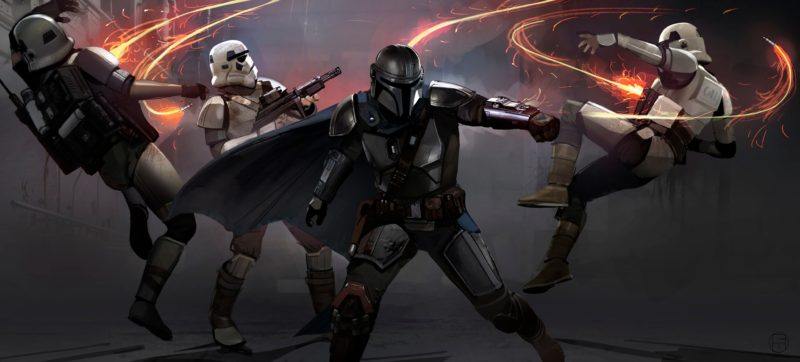Bounty Hunters and Privateers in The Mandalorian

I’m a giant Star Wars geek, and I tend to be very forgiving. Hence, I loved the first season of The Mandalorian, the new series on the streaming service Disney+. For the uninitiated, the series is about a bounty hunter, a Mandalorian, who is just known as “Mando” and who makes his living by scooping up bail jumpers and other prizes.
The series has me thinking about private security, particularly as we get ever closer to the twentieth anniversary of the September 11, 2001 attacks and as we get to the point where more and more soldiers who go to Afghanistan will be going to fight a war that started before they were born.
Might The Mandalorian at least get us thinking about whether or not there are better ways to do this? Better ways to enforce the law? Better ways to deal with people who do terrible, horrible things? At the very least, might we get similar outcomes for a lower price?
I suspect we can. Even if we had put bounties of billions on the heads of Osama bin Laden and his henchmen, we likely could have gotten a similar result at a much lower cost than the trillions we have spent on war since 9/11/01. I suspect there would have been a lot less collateral damage. Indeed, Ron Paul proposed something like this after the 9/11 attacks.
It wouldn’t be a radically new thing. Historically, countries would issue letters of marque and reprisal against pirates and enemy ships with payout going to whoever brought in the cargo. Privateers were basically bounty hunters.
In the first episode, we learn a lot about rules among the bounty hunters and specifically the treaties and agreements that govern bounties, their capture, and the distribution of the spoils. I’m reminded in reading all this of Peter Leeson’s work on anarchy, pirates, and the constitution of piratical consent. Moreover, I’m reminded of AIER President Edward Stringham’s work on the history of private security, a lot of which provides at least a proof of concept for the private provision of what is nominally a public good.
Consider the incentives facing the bounty hunter. Will they waste resources? It isn’t likely. During one exchange about a possible bounty, Mando tells Carl Weathers that 5,000 “won’t even pay for the fuel.” He has an incentive to be a bit more careful about what he says “yes” and “no” to than someone who is spending other people’s money. Contrast this with someone who is simply voting for or against war. They don’t have any skin in the game, and therefore, they don’t have an incentive to compare costs and benefits clearly and completely.
It’s illustrated during a bit where the Mandalorian finds himself bargaining over stolen goods. The problem, and what makes it intriguing, is that he’s trying to buy back stolen parts from his own ship (think about this the next time you hear about people seeking federal grants). There is an interesting Coasian experiment, and an interesting exercise for living, in the second episode (parenthetically, I’m pretty sure I understand the “no disintegrations” line in The Empire Strikes Back). Jawas strip Mando’s ship of a lot of valuable parts–rendering it essentially unflyable–and Mando has to get his parts back. He fails to get his stuff back when he attacks the Jawas’ land barge and ends up in a situation where he is protesting the injustice of having to buy back the parts the Jawas stole. Unjust? Undoubtedly, but, for the most part, irrelevant. The Mandalorian isn’t in a situation to debate the injustice of his parts being stolen. He just needs them back. Hence, bargaining with the Jawas for the stolen merchandise is the best of his unlovely options.
I’m reminded of discussions I’ve had with Michael Munger and presentations he has given on institutions and how they evolve (a lot of this is similar to the work being done by Barry Weingast and his last decade or so of work with Douglass North and John Joseph Wallis). In some cases, injustice is just something we have to accept in an imperfect world. Actually getting to a better position is the constitutional/institutional problem. In this case, the Mandalorian had to grit his teeth and accept one evil in order to prevent a much larger one.
In a later episode, the Mandalorian finds himself contract-fighting on behalf of a group of krill farmers who find themselves facing regular raids from nearby bandits with an AT-ST. I’m reminded of one of the things that has kept people poor for almost all of history: raiding and fending off raids. A few minutes of the episode show people training for their battle with the raiders.
There are a couple of ways in which we see resources being wasted. First, there are the raiders themselves. They aren’t actually doing anything productive. They’re investing in transfers (it’s like robbing a record store, or lobbying). During the training scene, we see the people of the village preparing to fight with the bandits. What are they doing while they are training? They are preparing to protect their property, but importantly, they aren’t actually farming any krill or doing anything productive. The big question in political economy, I think, concerns how the institutions emerge and what they reward. It’s one thing to say that people are better off when they trade rather than raid. It’s something else entirely to get the institutions right.
The Mandalorian is fantastic fan service for people who love science fiction, westerns, and Star Wars specifically. I’m excited about the long term future of the Star Wars universe given that, in a world with Disney+, we can expect regular new entries in the Star Wars canon (apparently, there are plans for an Obi-Wan Kenobi series and another on Cassian Andor). As always, there are some interesting illustrations of basic economic ideas and some ideas that are at the cutting edge of research in the social sciences. As I say pretty regularly, economics is everywhere. Even on planets visited by science fiction bounty hunters.










